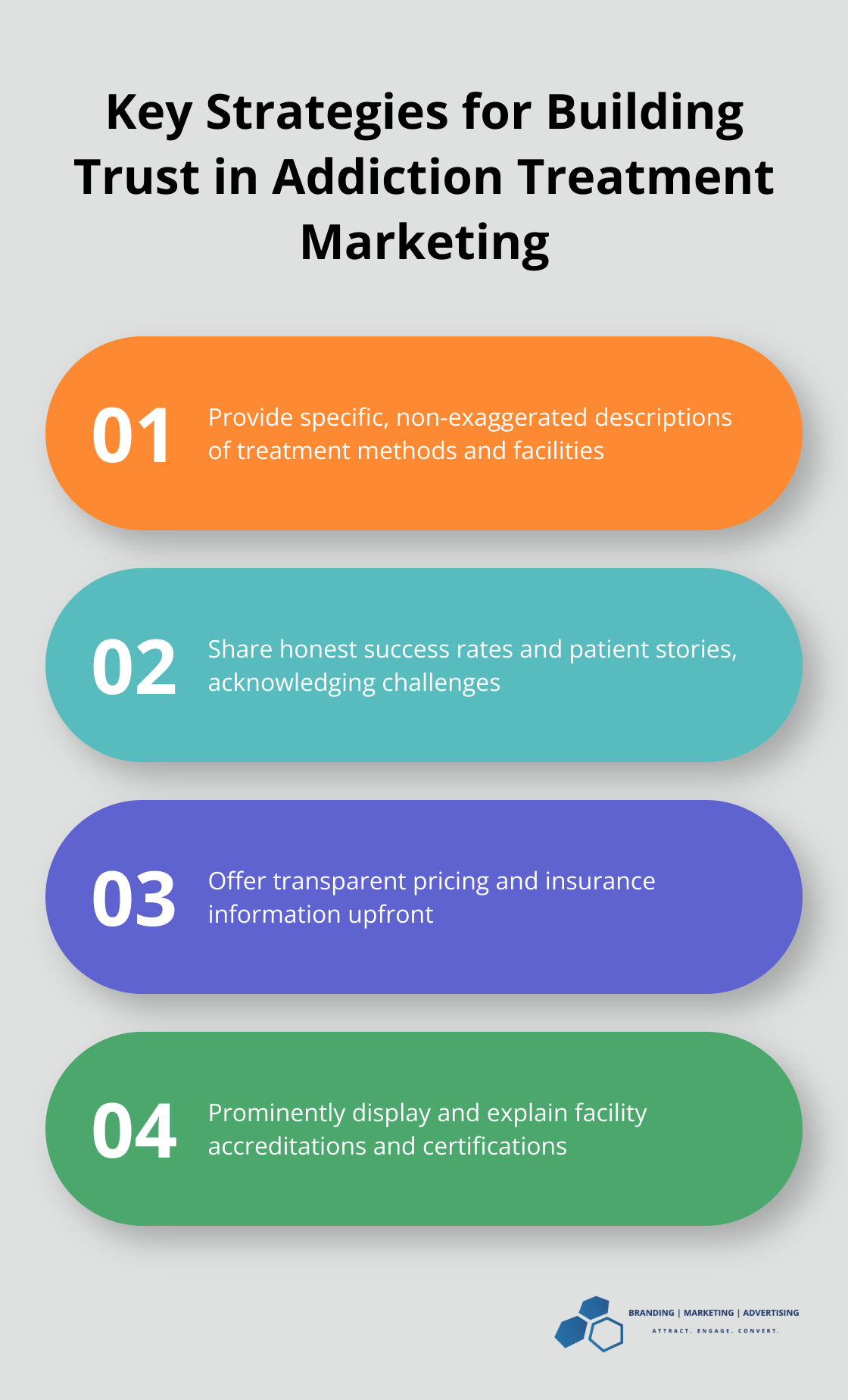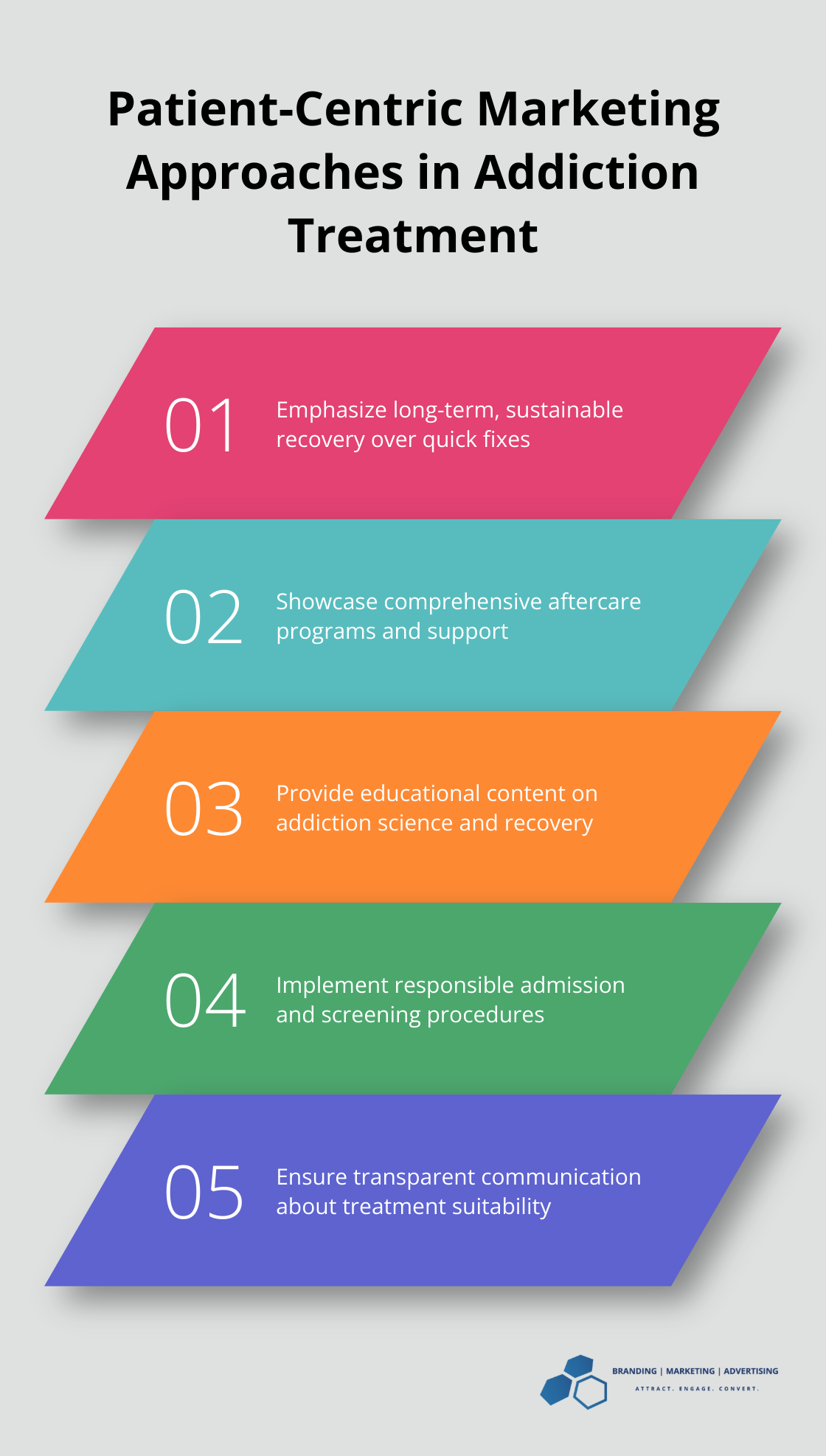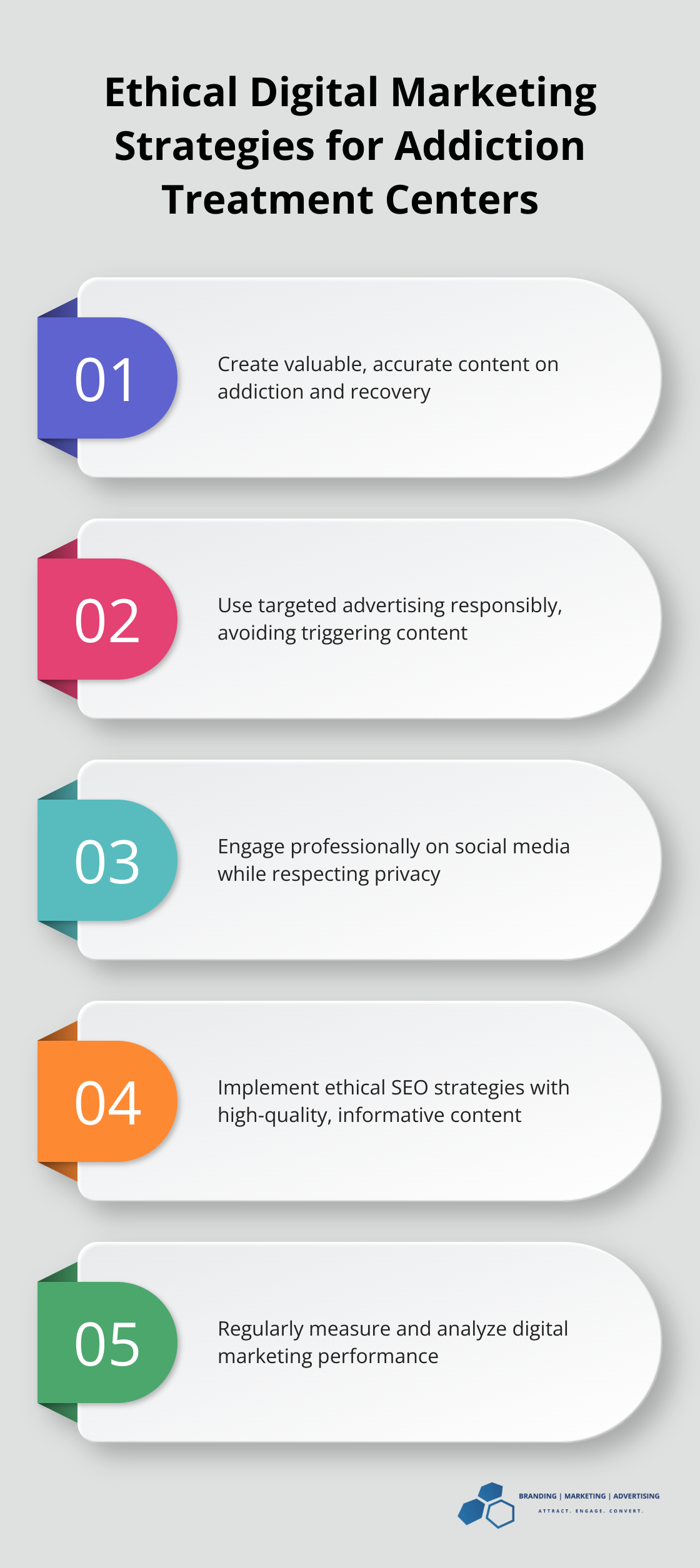Ethical Marketing Strategies for Addiction Treatment Centers
At Branding | Marketing | Advertising, we understand the critical role ethical marketing plays in the addiction treatment industry.
Addiction treatment centers face unique challenges when promoting their services. They must balance the need to attract clients with the responsibility to provide accurate, compassionate care.
This blog post explores ethical marketing strategies that addiction treatment facilities can implement to build trust, prioritize patient well-being, and responsibly leverage digital platforms.
Building Trust Through Transparency
At Branding | Marketing | Advertising, we understand that trust forms the foundation of successful addiction treatment marketing. Transparency isn’t just a buzzword-it’s a necessity in this sensitive field.
Accurate Service Representation
When you describe your services, be specific and avoid exaggeration. Instead of vague promises, outline your treatment methods, staff qualifications, and facility amenities. For example, if you offer cognitive behavioral therapy, explain how it works and its potential benefits for addiction recovery.
Success Rates and Outcomes
Honesty about your success rates is paramount. Acknowledge the reality of substance use disorders while highlighting your center’s approach to reducing relapse risks. Share anonymized patient stories that showcase both challenges and triumphs in recovery.
Clear Pricing and Insurance Information
Financial transparency plays a critical role. Provide detailed information about treatment costs and accepted insurance plans. Upfront financial information helps potential patients make informed decisions.
Accreditations as Trust Signals
Highlight your center’s accreditations and certifications prominently. Becoming an accredited facility shows a provider’s ability to meet standards of quality and care in addiction therapy practices. Explain what these accreditations mean in practical terms for patient care and safety.
Trust-building isn’t about perfection-it’s about honesty and commitment to patient well-being. These strategies create a foundation of trust that supports long-term recovery and ethical business practices. As we move forward, let’s explore how prioritizing patient well-being can further enhance your ethical marketing approach.

Patient-Centric Marketing: Prioritizing Well-being in Addiction Treatment
At Branding | Marketing | Advertising, we believe that ethical marketing in addiction treatment centers must prioritize patient well-being. This approach aligns with moral standards and builds long-term trust and success.
Focus on Sustainable Recovery
Addiction treatment marketing should emphasize sustainable recovery rather than quick fixes. The National Institute on Drug Abuse (NIDA) is the lead federal agency supporting scientific research on drug use and addiction. We recommend highlighting your center’s commitment to long-term care through:
- Personalized treatment plans
- Evidence-based therapies
- Relapse prevention strategies
- Alumni support programs
Comprehensive Aftercare Programs
Effective aftercare plays a vital role in maintaining sobriety. Addiction treatment can be effective, and it’s important to assess a program’s efficacy. When marketing your services, showcase your aftercare offerings:
- Outpatient counseling
- Support group connections
- Vocational assistance
- Regular check-ins and progress monitoring
Empowering Through Education
Providing knowledge to patients and families forms a cornerstone of ethical marketing. We suggest creating and promoting educational content such as:
- Informative blog posts on addiction science
- Webinars on coping strategies
- Family support guides
- Recovery milestone infographics
Responsible Admission Processes
Implementing ethical screening and admission procedures demonstrates your commitment to patient welfare. Consider highlighting your center’s ethical practices:
- Comprehensive initial assessments
- Appropriate level of care recommendations
- Transparent communication about treatment suitability
- Referrals to alternative providers when necessary
These patient-centric strategies allow addiction treatment centers to market their services ethically and effectively. This approach not only attracts clients but also contributes to better outcomes and a positive reputation in the community. As we move forward, we’ll explore how to leverage digital marketing responsibly to further enhance your ethical marketing efforts.

Leveraging Digital Marketing Responsibly in Addiction Treatment
Creating Informative and Supportive Content
Content marketing for addiction treatment centers should provide valuable, accurate information. SAMHSA reports that as of November 23, 2024, there are various treatment options available for substance use disorders. This underscores the need for educational content to help bridge the gap in understanding and accessing treatment.
We recommend a content calendar that includes:
- Signs and symptoms of addiction
- The science behind addiction and recovery
- Different treatment modalities and their effectiveness
- Success stories (with proper consent and anonymity)
- Resources for families and loved ones
Implementing Ethical Targeted Advertising
Targeted advertising can effectively reach those in need, but responsible use is paramount in addiction treatment marketing. The National Association of Addiction Treatment Providers (NAATP) provides information about drugs of misuse, statistics, and how to identify potential substance use disorders as of March 31, 2025.
Key considerations include:
- Avoid triggering imagery or language in ads
- Target based on intent rather than vulnerability
- Maintain transparency about your facility and services
- Comply with all relevant regulations (including HIPAA)
Engaging Responsibly on Social Media
Social media platforms allow addiction treatment centers to connect with potential patients and their families. However, maintaining professional boundaries and respecting privacy is essential.
Best practices encompass:
- Share educational content and resources
- Highlight community involvement and events
- Respond promptly and professionally to inquiries
- Never share identifiable patient information
Implementing Ethical SEO Strategies
Search engine optimization (SEO) helps potential patients find your treatment center online. It’s important to implement SEO strategies ethically.
Effective and ethical SEO tactics include:
- Optimize for local search terms
- Create high-quality, informative content
- Build legitimate backlinks from reputable sources
- Use accurate meta descriptions and title tags
Avoid exaggerated claims or black hat SEO techniques that could harm your reputation and violate search engine guidelines.
Measuring Digital Marketing Performance
Regular measurement and analysis of your digital marketing efforts ensure they remain ethical and effective. Tools like Google Analytics provide valuable insights into website traffic, user behavior, and conversion rates.
Key metrics to track:
- Organic search traffic
- Engagement rates on social media
- Click-through rates for ads
- Conversion rates for contact forms or calls
Regular review of these metrics (ideally monthly or quarterly) allows you to identify areas for improvement and ensure your digital marketing strategy aligns with ethical standards and best practices.

Final Thoughts
Ethical marketing in addiction treatment balances business goals with patient care. Treatment centers establish credibility through accurate service representation, honest communication of success rates, and clear pricing information. Patient well-being takes center stage when facilities focus on long-term recovery, offer comprehensive aftercare, and provide educational resources that extend beyond initial treatment.
Digital strategies play a vital role in reaching those who need help while maintaining integrity. Treatment centers create informative content, use targeted advertising ethically, and implement responsible SEO practices to attract clients effectively. These approaches contribute to better outcomes and a positive industry reputation.
Branding | Marketing | Advertising specializes in developing ethical, effective marketing strategies for addiction treatment centers. Our team understands the complexities of this field and aligns marketing efforts with your center’s values and goals. Visit our website to learn how we can support your mission in helping individuals struggling with addiction.












